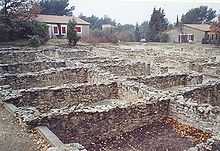Entremont (oppidum)

Entremont is a 3.5 hectare archaeological site three kilometres from Aix-en-Provence at the extreme south of the Puyricard plateau.[1] In antiquity, the oppidum at Entremont was the capital of the Celtic-Ligurian confederation. It was settled between 180 and 170 B.C., somewhat later than the inhabitation of other Gallic oppida, such as Saint-Blaise (7th to 2nd centuries B.C.).[2][3][4] The site was abandoned when it was taken by the Romans in 123 B.C. and replaced by Aquae Sextiae (modern Aix-en-Provence), a new Roman city founded at the foot of the plateau.[5] By 90 B.C., the former oppidum was completely uninhabited.
The site contains two distinct areas of settlement surrounded by ramparts. Archaeologist Fernand Benoit named the older area, on the summit, "Ville Haute", and the lower "Ville Basse". Subsequently it was recognised that the latter was an enlargement of the former, and they are now labelled "Habitat 1" and "Habitat 2", respectively.[6]
Finds from the site are displayed at Musée Granet and include statues, bas-reliefs and impressive severed heads.
References
- ↑ Histoire d'une ville. Aix-en-Provence, Scéren, CRDP de l'académie d'Aix-Marseille, Marseille, 2008, p. 20-25.
- ↑ Patrice Arcelin, « Avant Aquae Sextiae, l'oppidum d'Entremont » in Carte archéologique de la Gaule : Aix-en-Provence, pays d'Aix, val de Durance, 13/4, Fl. Mocci, N. Nin (dir.), Paris, 2006, Académie des inscriptions et belles-lettres, ministère de l'Éducation nationale, ministère de la Recherche, ministère de la Culture et de la Communication, maison des Sciences de l'homme, centre Camille-Jullian, ville d'Aix-en-Provence, communauté du pays d'Aix, p. 125.
- ↑ Voyage en Massalie. 100 ans d'archéologie en Gaule du Sud, Musées de Marseille/Édisud, Marseille-Aix-en-Provence, 1990, p. 251.
- ↑ Historiquement, le début de peuplement du plateau d'Entremont correspond à la période d'abandon des oppida de Teste-Nègre (Les Pennes-Mirabeau) et de Notre-Dame-de-Pitié (Marignane).
- ↑ « Histoire d'Aix », site de l'office du tourisme d'Aix-en-Provence.
- ↑ Voyage en Massalie..., op. cit., p. 102.
43°33′08″N 5°26′21″E / 43.552222°N 5.4391666°E